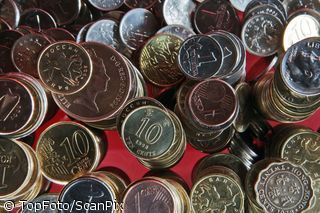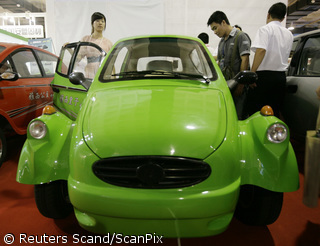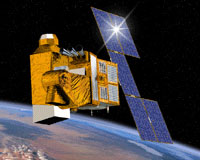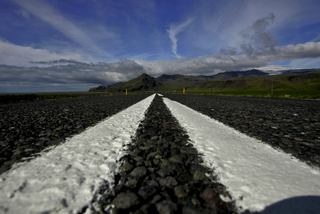A desert country ruled by a virtual dictatorship, Turkmenistan has drawn international interest for one reason: its enormous oil and natural gas deposits.
Published:
21 September 2001 y., Friday
Turkmenistan sits in central Asia, bordering the oil-rich Caspian sea to the west, Kazakhstan and Uzbekistan to the north, and Iran and Afghanistan to the south and west.
With only 3 percent of its land - a territory slightly larger than California - suitable for farming, the predominantly Muslim nation's economy is centered around oil and natural gas.
Since achieving independence with the collapse of the Soviet Union in 1991, the country has remained stable under the autocratic rule of President Saparmurat Niyazov, but has seen its economy contract sharply.
Much of the nation's history involves exploitation by despots; so much so that the 66 years it spent as part of the Soviet Union were a period of relative prosperity.
Even if the nation meets economic growth targets in 2001, however, GDP will still be only 59 percent of pre-independence levels.
Turkmenistan has been reluctant to line up with regional alliances. Its leaders have been feuding for years with neighboring countries over control of oil deposits below the Caspian Sea.
Recently, international aid groups have warned of a growing AIDS problem among Turkmenistan's 4.5 million inhabitants, as well as in the surrounding countries of Central Asia.
Šaltinis:
abcnews
Copying, publishing, announcing any information from the News.lt portal without written permission of News.lt editorial office is prohibited.
The most popular articles
 The European Commission today concluded on the existence of excessive deficits in Cyprus, Denmark and Finland and recommended deadlines for their correction to the Council.
more »
The European Commission today concluded on the existence of excessive deficits in Cyprus, Denmark and Finland and recommended deadlines for their correction to the Council.
more »
 Over 2000 former construction workers in Spain and nearly 600 ex-employees of Irish glass company Waterford Crystal and its suppliers will receive a total of €11 million in aid from the EU Globalisation Adjustment Fund to help with training, business start-ups and job guidance under plans agreed by MEPs and the Council of Ministers.
more »
Over 2000 former construction workers in Spain and nearly 600 ex-employees of Irish glass company Waterford Crystal and its suppliers will receive a total of €11 million in aid from the EU Globalisation Adjustment Fund to help with training, business start-ups and job guidance under plans agreed by MEPs and the Council of Ministers.
more »
 MEPs on Tuesday decided six top priorities and a number of additional key issues for the upcoming negotiations on the 2011 budget.
more »
MEPs on Tuesday decided six top priorities and a number of additional key issues for the upcoming negotiations on the 2011 budget.
more »
 The EU-China Science and Technology Week starts today at the heart of World Expo Shanghai.
more »
The EU-China Science and Technology Week starts today at the heart of World Expo Shanghai.
more »
 European Climate Action Commissioner Connie Hedegaard and European Investment Bank President Philippe Maystadt agreed on Monday to explore a joint climate finance initiative for developing countries as part of the European Union commitment made at the UN climate conference in Copenhagen last December.
more »
European Climate Action Commissioner Connie Hedegaard and European Investment Bank President Philippe Maystadt agreed on Monday to explore a joint climate finance initiative for developing countries as part of the European Union commitment made at the UN climate conference in Copenhagen last December.
more »
 Sustainability, competitiveness and security of energy supply: the three pillars to the foundation of a new EU energy community.
more »
Sustainability, competitiveness and security of energy supply: the three pillars to the foundation of a new EU energy community.
more »
 EU Trade Commissioner Karel De Gucht and Palestinian Minister of National Economy Hasan Abu-Libdeh today discussed measures to enhance EU-Palestinian bilateral trade relations and to facilitate trade of Palestinian products to EU markets.
more »
EU Trade Commissioner Karel De Gucht and Palestinian Minister of National Economy Hasan Abu-Libdeh today discussed measures to enhance EU-Palestinian bilateral trade relations and to facilitate trade of Palestinian products to EU markets.
more »
 Some of the most innovative and exciting transport research projects funded by the EU are being showcased at the Transport Research Arena (TRA) in Brussels this week.
more »
Some of the most innovative and exciting transport research projects funded by the EU are being showcased at the Transport Research Arena (TRA) in Brussels this week.
more »
 Nowadays we rely heavily on satellite positioning and navigation, but the only available technology is American.
more »
Nowadays we rely heavily on satellite positioning and navigation, but the only available technology is American.
more »
 The European Commission will reveal how it aims to revamp its transport networks policy in response to the challenges of the 21st century at a conference dedicated to the Trans-European Transport Network (TEN-T) in Zaragoza on 8 and 9 June.
more »
The European Commission will reveal how it aims to revamp its transport networks policy in response to the challenges of the 21st century at a conference dedicated to the Trans-European Transport Network (TEN-T) in Zaragoza on 8 and 9 June.
more »